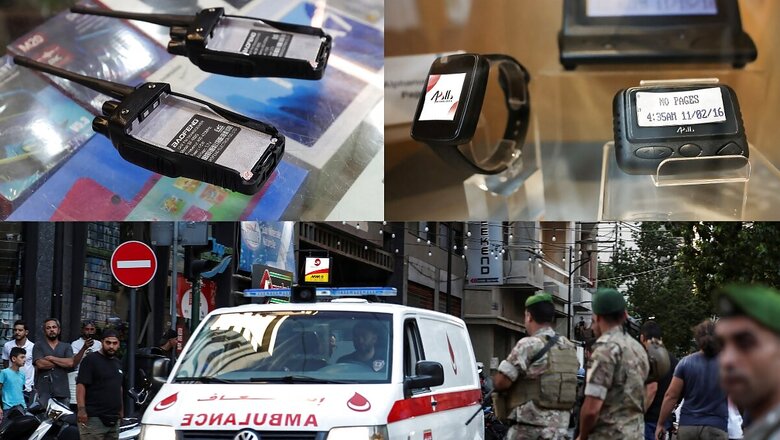
views
A second wave of blasts struck Hezbollah on Wednesday as thousands of radios and other devices used by the group detonated across Lebanon, killing at least 20 people and pushing Israel and Hezbollah to the brink of all-out war.
The series of blasts, which also wounded over 450 people, came a day after the simultaneous explosion of hundreds of paging devices used by Hezbollah killed 12 people, including two children, and wounded up to 2,800 others across Lebanon, in an unprecedented attack blamed on Israel.
‘Historic & Unprecedented’
John Spencer, chair of urban warfare studies at West Point, expressed his astonishment at the strategy behind the recent cyberattack on Hezbollah. In a series of posts on X on Wednesday, Spencer noted that while there have been many significant intelligence operations and surprise attacks throughout history, he had never seen one as precise and widespread as this. “I cannot find a similar intelligence/military operation with such secrecy, lethality, ingenuity, and audacity,” he wrote.
“In a single operation, the terrorist group Hezbollah was significantly impacted. Not only in physical injuries – unknown but reported in the thousands. The attack also exposed the Hezbollah network not just in Lebanon but in other places in the Middle East where Hezbollah agents or affiliated agents were carrying this specific pager issued by Hezbollah,” he said in another post.
1) Historic & unprecedented. I cannot find a similar intelligence/military operation with such secrecy, lethality, ingenuity, audacity, impact. While there have been other major intelligence operations in war (breaking Enigma, various spies inside governments) or surprise attacks…— John Spencer (@SpencerGuard) September 18, 2024
US warns against escalation
There was no comment from Israel, which only hours before Tuesday’s attacks had announced it was broadening the aims of its war with Hamas in Gaza to include its fight against the Palestinian group’s ally Hezbollah. “The centre of gravity is moving northward,” Israeli Defence Minister Yoav Gallant said on Wednesday. “We are at the start of a new phase in the war.” Israeli officials have remained tight-lipped about the explosions that led the television news bulletins and dominated newspaper headlines.
The White House warned all sides against “an escalation of any kind”. “We don’t believe that the way to solve where we’re at in this crisis is by additional military operations at all,” US National Security Council spokesman John Kirby told reporters. The Iran-backed Hezbollah has traded near-daily cross-border fire with Israeli forces since Palestinian militants attacked Israel on October 7, sparking the war in Gaza.
Les The United States was not involved in any way” in the explosions at Lebanon, said John Kirby, spokesman for the White House National Security Council.#Pager #PagerExplosions #IsraelLes États-Unis n’ont participé d’aucune manière” aux explosions au Liban, a… pic.twitter.com/UhQSAdK3rD
— Ωmega News (@satch_omega) September 19, 2024
Lebanese Foreign Minister Abdallah Bou Habib warned that the “blatant assault on Lebanon’s sovereignty and security” was a dangerous development that could “signal a wider war”. Hezbollah said Israel was “fully responsible for this criminal aggression” and vowed revenge. The influx of so many casualties all at once overwhelmed hospitals in Hezbollah strongholds. At a Beirut hospital, doctor Joelle Khadra said “the injuries were mainly to the eyes and hands, with finger amputations, shrapnel in the eyes — some people lost their sight.”
Heavy blow to Hezbollah
Analysts said operatives had likely planted explosives on the paging devices before they were delivered to Hezbollah. “A small plastic explosive was almost certainly concealed alongside the battery, for remote detonation via a call or page,” said Charles Lister of the Middle East Institute. The attack dealt a heavy blow to Hezbollah, which already had concerns about the security of its communications after losing several key commanders to targeted air strikes in recent months.
The preliminary findings of a Lebanese investigation into the blasts found the pagers had been booby-trapped, a security official told AFP. A source close to Hezbollah said the pagers were “recently imported” and appeared to have been “sabotaged at source”. After The New York Times reported that the pagers had been ordered from Taiwanese manufacturer Gold Apollo, the company said they had been produced by its Hungarian partner BAC Consulting KFT.
‘Deeply Alarmed’
Since October, the unabating exchanges of fire between Israeli troops and Hezbollah have killed hundreds of people in Lebanon, and dozens including soldiers on the Israeli side. They have also forced tens of thousands of people on both sides of the border to flee their homes. “I’m deeply alarmed by reports that a large number of communication devices exploded across Lebanon & Syria, killing at least 11 people, including children, and injuring thousands. All actors must exercise maximum restraint to avert any further escalation,” UN chief António Guterres said in a post on X.
United Nations rights chief Volker Turk said Tuesday’s attack had come at an “extremely volatile time”, calling the blasts “shocking” and their impact on civilians “unacceptable”. Guterres urged governments “not to weaponise civilian objects”. Senior diplomats from the United States, Britain, Germany, France and Italy will meet on Thursday in Paris to discuss the spiralling tensions in the Middle East, sources said, ahead of a UN Security Council meeting planned for Friday.
(With agency inputs)












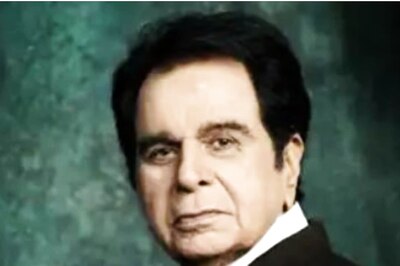



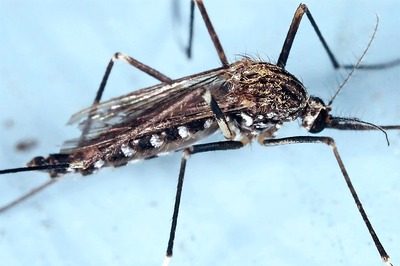

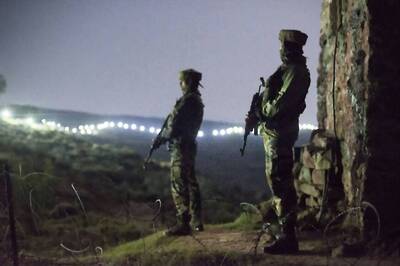
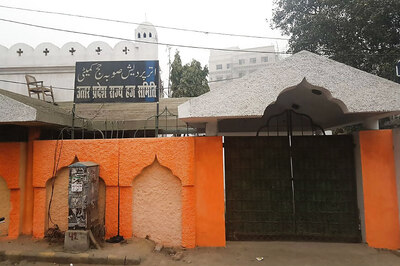
Comments
0 comment